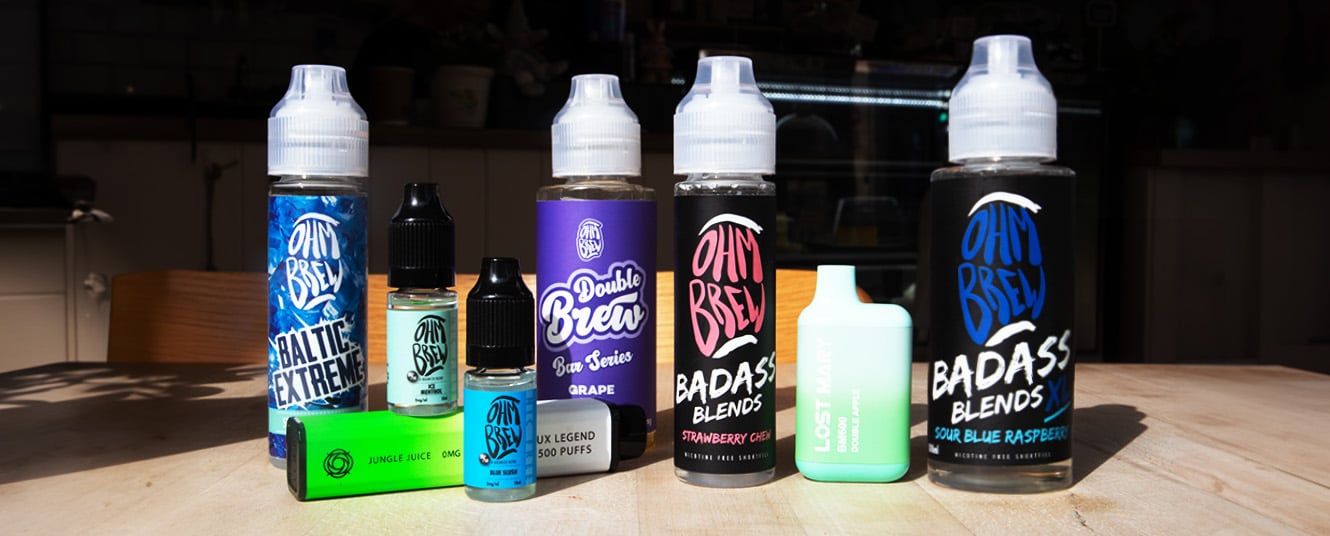- How many nicotine-free vapes are sold in the UK?
- How are nicotine-free vapes regulated?
- The legal age to vape without nicotine in the UK
- Can nicotine be added to a nicotine-free vape?
- How many young people are using nicotine-free vapes?
- What restrictions might the Government impose on nicotine-free vapes?
- How will the Vaping Products Duty affect the price of nicotine-free vapes?
- Timeline: proposed changes to vaping laws so far
There’s a chance that we’ll see changes to the way nicotine-free vapes are sold in the UK, as new vaping regulations are a distinct possibility in the future.
While vapes with no nicotine don’t pose concerns around risk or addiction, the Tory Government were looking for ways to close loopholes that nicotine-free vapes could create. Basically, in an effort to reduce ways for young people to access vapes or nicotine, we may see the introduction of some restrictions around nicotine-free vapes too.
How many nicotine-free vapes are sold in the UK?
According to the Creating a smokefree generation consultation outcome released by the Government, there is very little available data on the exact number of nicotine-free vapes sold in the UK. That said, research company Nielsen reports that the total coverage of zero-nicotine in Great Britain in the 26 weeks up to 1 July 2023 in supermarkets and convenience stores had sales of £575,000. This doesn’t include dedicated vape shops or specialist online retailers, which is where the majority of short fill non-nicotine vapes are sold.
How are nicotine-free vapes regulated?
Unlike vapes containing nicotine, which are covered by the Tobacco and Related Products Regulations 2016 (TRPR), nicotine-free vapes fall under the General Products Safety Regulations 2005 (GPSR). These regulations are designed to help make sure that only safe products are released to the market.
The legal age to vape without nicotine in the UK
Not only are nicotine-containing and nicotine-free vapes currently subject to different regulations but they also aren’t subjected to the same age restrictions, with the exception of Scotland where both fall under the Health Tobacco, Nicotine etc. and Care Act 2016. However, many responsible retailers will treat nicotine-free vape products the same way as they would those with nicotine, and only sell to those over the age of 18. This is the most significant place we expect to see change in regulations for nicotine-free vapes, as the Government have expressed an intention to implement an age restriction on these products.
Can nicotine be added to a nicotine-free vape?
It is not possible to add nicotine to the kind of non-nicotine disposable vapes that are currently on the market. Disposable vapes are designed to be self-contained, so users can’t make changes to the e-liquid they contain.
Also, as we mentioned above, it is possible to add nicotine to short fill e-liquids. These are sold without nicotine, allowing people to mix their own vape juice by adding nicotine in the form of nic shots. Nicotine-free vapes or short fill e-liquids used without the addition of nicotine are a useful option for people who have comfortably quit smoking and weaned themselves off nicotine, but who find that the habitual nature of vaping helps them stay away from cigarettes.
However, because these nicotine-free e-liquids are not subject to the same restrictions as nicotine containing vape products, there is a chance that young people could buy short fill vape juices with zero nicotine and add nic shots themselves. Illicit sellers could also potentially use this to their advantage, by targeting underage buyers with zero nicotine products, with the plan to allow them to add nicotine at a later date. Unscrupulous sellers may even advertise specifically to younger buyers, should a loophole remain around advertising non-nicotine vape products. They could then capitalise on this by illegally selling age restricted products.
How many young people are using nicotine-free vapes?
The vast majority of young people who are vaping are choosing vapes with nicotine either all or some of the time. In the 2023 Action on Smoking and Health (ASH) report Use of e-cigarettes among young people in Great Britain, it is reported that 51% of 11-17 year olds who currently vape said that the e-cigarette they used most often always contained nicotine. A further 30% said it sometimes contained nicotine, 9.5% that it never contained nicotine and 10% said they didn’t know.
These figures were very close to the results for 2022, where 51% said always, 30% sometimes, 10% never, 8.7% don’t know. This suggests that when young people are vaping or experimenting with vapes, they are most often also choosing or gaining access to products with nicotine.
At Evapo, this leads us to believe that a tightening of regulations around who can sell vaping products is needed. We strongly support a licensing scheme that would mean vaping products are only sold by specialist retailers, as well as a call for more substantial fines for those who are caught selling vapes to underage people. Alongside the UK Vaping Industry Association (UKVIA), we propose the introduction of £10,000 on-the-spot fines for retailers.
What restrictions might the Government impose on nicotine-free vapes?
The Tory Government had made it clear that nicotine-free vapes would be an area targeted in new regulations they planned to introduce as part of their plan to tackle underage vaping. Based on the questions and responses around nicotine-free products posed in the public consultation we can get an idea of what these regulations and restrictions may look like.
When asked ‘Do you think non-nicotine e-liquid, for example short fills, should also be included in restrictions on vape flavours?’ 47.2% of respondents answered no, while 40.9% answered yes. This suggests that the proposed vape flavour restrictions may be extended to include nicotine-free vape juice.
The leading reasons respondents gave for saying they should be included were to make regulations simpler and easier for people to understand and to avoid loopholes around marketing or advertising regulations.
Likewise, when asked if they thought the Government should regulate nicotine-free vapes under a similar regulatory framework as nicotine vapes, the majority, 59.6%, said yes, while 32.7% said no, 7.8% said they don’t know. With such strong support for simplification, it would not be surprising if the Government chose to include nicotine-free vapes in changes to regulations.
There was also confirmation that nicotine-free disposable vapes would be included in the single-use vape ban, which came into effect on June 1st 2025. The recently released draft Statutory Instrument and Explanatory Memorandum from the English Government cites that the ban on the supply and sale of disposable vapes ‘includes both nicotine and non-nicotine containing products.’
In the Tobacco and Vapes Bill, introduced to Parliament on 20 March 2024, it was confirmed that the Government were seeking powers to introduce a new age restriction for non-nicotine vapes in England and Wales. This was in order to close any loopholes that may be exploited due to nicotine-free products not currently being age restricted. The Bill got its second reading in the House of Commons on 16 April 2024, giving MPs an opportunity to debate the main principles of the Bill, and vote for it to proceed to the committee stage for further debates and amendments. However, the Bill was not passed before parliament dissolved on 30 May 2024, and so has effectively been abandoned along with all the progress it had made through parliament thus far.
The new Labour Government announced in The King's Speech that they were planning to reintroduce the Tobacco and Vapes Bill, and the reworked version of the Bill received its first reading in Parliament on 5 November 2024.
The legislatory changes proposed in the Tobacco and Vapes Bill are one of the key topics being analysed in an inquiry into the role of vaping in the UK by the All Party Parliamentary Group for Responsible Vaping. The inquiry will help to form a report of analysis, evidence, and legislative suggestions aiming the ensure that the crucial role of vaping as a stop smoking aid is appropriately considered in the creation of any new laws.
How will the Vaping Products Duty affect the price of nicotine-free vapes?
As part of the 2024 Spring Budget the Government announced the intention to introduce a ‘Vaping Products Duty’ which will be applied to vape liquids either at the point of manufacture if produced in the UK, or the point of importation if produced outside of the UK.
The rate of duty added to e-liquids was previously planned to vary depending on the nicotine strength, but in the Autumn Budget it was revealed that now a flat rate of £2.20 per 10ml will be applied to all e-liquids. This would have a major impact on the pricing of popular nicotine-free short fills, increasing the average price of a 100ml short fill from £15 to a whopping £41.40, an increase of 176%. This means we will likely see a shift in the kinds of products many vapers choose to use, from short fills to 10ml bottles.
To ensure that vaping remains a significantly cheaper option than smoking the Vaping Products Duty, which is due to come into force in October 2026, a one-off increase in tobacco duties will also be applied.

Timeline: proposed changes to vaping laws so far
11 April 2023 – The Government issues an eight week ‘Youth vaping: call for evidence’ in order to identify ways to make it harder for youths to access vaping products, 441 responses from individual citizens and organisations are recorded.
12 October 2023 – Public responses are sought for the ‘Creating a smokefree generation and tackling youth vaping’ public consultation.
7th November 2023 – Plans for a 'Tobacco and Vapes Bill' which would give the Government new power to create legislation are revealed in the King’s speech.
6 December 2023 – The public consultation is closed, and the 28,000 responses are collated.
29 January 2024 – The Government publishes the full consultation outcome and outlines the various measures that will be considered.
6 March 2024 – The Government announce a ‘Vaping Products Duty’ as part of the Spring Budget 2024, which will impose a tax on e-liquids, including nicotine-free products.
20 March 2024 - The Tobacco and Vapes Bill is introduced to Parliament, seeking new powers to regulate vaping products, including the introduction of an age restriction for nicotine-free vapes.
16 April 2024 - The Tobacco and Vapes Bill got its second reading in the House of Commons to allow for initial debates.
22 May 2024 - A general election is called.
30 May 2024 - Parliament is dissolved. As the Tobacco and Vapes Bill did not pass during the two day 'wash-up' it has been dropped and all progress lost.
4 July 2024 - A general election is held and the Labour Party are voted in.
17 July 2024 - It is announced in The King's Speech that the Labour Party do plan to reintroduce the Tobacco and Vapes Bill.
9 October 2024 - The launch of an inquiry into the role of vaping in the UK, conducted by the All Party Parliamentary Group for Responsible Vaping.
5 November 2024 - The new Labour Government introduced their reworked Tobacco and Vapes Bill to Parliament.
26 November 2024 - The Tobacco & Vapes Bill passed its second reading in the House of Commons.
7 January 2025 - The bill entered the committee stage, having been voted through at the second reading.
30 January 2025 - The committee stage concluded, with the bill now moving on to the report stage.
27 March 2025 - Having passed all stages in the House of Commons, the bill has now progressed on to the House of Lords.
23 April 2025 - The bill passed its second reading in the House of Lords and moved on to the committee stage.
1 April 2025 - The date previously proposed in the Tobacco and Vapes Bill for all new vaping regulations to be brought in, which will no longer be happening as the Bill has been abandoned.
24 February 2026 - The Bill will enter the report stage in the House of Lords.
Sources
Gov.uk 12/02/2024
Legislation.gov.uk 2016
Gov.uk 2005
Legislation.gov.uk 2016
Ash.org.uk 06/2023
Gov.uk 11/03/2024
Gov.uk 11/03/2024
Gov.uk 11/03/2024
Gov.uk 06/03/2024
responsiblevapingappg.org 09/10/2024


























